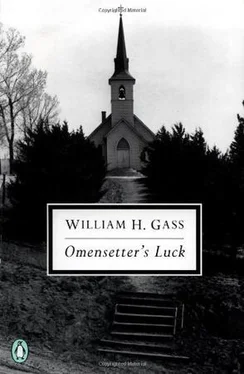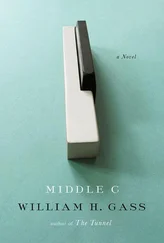The Reverend Jethro Furber rose that Sunday to the pulpit with excitement blazing from him. There was a stirring in the church at late arrivals, and the broken hum and stutter of interrupted whispers filled it. He omitted the customary rites and spoke at once.
Our Heavenly Father, we speak within Your Hearing. May we speak with Your Truthful Voice. May we listen to Your Voice in us. May we harken to Your Thunder.
He'd spent a sleepless night. More than once, in complete darkness — it was better for the darkness — he had parted the curtain and shuffled to the stand and recited his piece, saying seven different things, believing each. There was no way to call back the words as they rushed out, he'd never remember them, and he was using, in these private sideshows, all his energy: yet before the pale geometry of the windows and in the presence of his own voice, he felt he had been moved to poetry. His flesh had prickled, tears had formed in his eyes, and he thought that at last he'd opened his heart out honestly. But he'd opened it to no one, really — to an audience of ghosts and churchmice. It was possible, of course, that in some corner, Flack, invisible in such surroundings, nigger like himself, was listening; and one pretended always that God, too, took an interest; but in this case — God, mice, Negro, weeping preacher — they came to nothing. He was exhausted, all nerves, disorganized; yet he meant, nevertheless, to try to fill their ears with fire. It was futile to hope that he could bring these creatures up, yet — yet he meant to try. Now he examined the space he intended to preach to. It lay just above an irregular terrain of heads and extended to the gray crossbeams of the nave with their pale dark ax marks and black spots of iron. Beginning at a point in front of him as far as he could leap, it reached through crisscrossing blades of light to the opposite wall where his melting sight composed the space's outer edge. He could imagine, looking at it, how chaos was before the first word. It was a striped waste, a visibly starless night. Dust, chambered in rods, lazily settled in no direction. Indistinctly he could see the tops of those fleshy cabinets which would compartment hell, while above, spanning the peak, were the long bars of heaven and the perching choirs of love. He thought of his voice passing into it, dust dancing to its tune. There'd be land in the shape of his syllables, a sea singing, sky like an echo, plants in bloom burning with speech, animals with yellow answering eyes, and finally men taking form from the chant of their names and gathering in crowds to enlarge their reply to the laments which had created them.
He didn't dare drop his eyes beyond their hair-capped foreheads. He'd slide off a nose or suffer a chin slip. Skid more than plummet — no posturing could mask it — he'd tip, dump! into shoes at the end. To find and utter the proper words, the logoi spermatakoi… that was Plato's game, poor John's jest. Pimber was the word these creatures wanted. Pimm-burr. He had at least one better word than that. The magic words, if he could utter them, would free them from every earthly thing. The steeple-tip of wise Plotinus. Alone like a bird. Farewell.
Nevertheless his eyes buzzed in their ears and bit their ankles. One, then two… one, two, one two — the usual line of shoes — a pair, a pair, another pair.. So farewell to faces. For god's sake, Mrs. Spink, be silent. Wait wait wait: screw. Gnawing at his nerves. Do not think of old ties — the desert loves the naked. One last look at faces. God. My God. Nose, cheek, chin, hair foresting the brow, ears at the edges, eyes like wells, the wrinkles running off, the raw lips, flaking skin… farewell. Christ, what an improbable design. Screw them down. "What are you doing in the world, brother, you who are more than the universe?" Tight. Tight. First — sweet gentle John: "he that loveth not knoweth not God." Then— full furious Jerome: "I am prepared to cut a foul-smelling nose." Tight down. Furber's right arm sailed. He watched it (n surprise. His voice when it began, was calm and light, smooth and precise.
I've intended for some time to tell you that I understand.
He paused, his eyes closed.
None of us wanted this world to begin with. We were orphaned into it. And we were never fooled. Not fundamentally. We've always known we had no place. I'm not speaking simply of our common Christian view. Anyone, however far from us in custom or in country he otherwise may be, so long as he is human, has a soul, and through that soul can sense, the same as we, his strangeness to the life that he's been sent to.
Confidently, Furber strode through the dark.
How I wept and shrieked, the saintly Greek, Empedocles, has written, when I was born into this world, my grave. And fallen in flesh, all infants howl. Empedocles believed that his soul, for its sins, must pass from body into body as water passes many sieves; that it must live through every form of dying and suffer every kind of end. It was his opinion that he had been a boy already, a girl, a plant in the woods, an eagle hunting in the mountains, and had spent, in the ocean, the glancing life of a fish. All the elements, he says, were united in rejecting him. The air had chased him to the sea, and the sea had spat him out on the earth's edge, and the earth had Rung him toward the sun.
We are here — yes — yet we do not belong. This, my friends, is the source of all religious feeling. On this truth everything depends. We are here, yet we do not belong; and though we need comfort and hope and strength to sustain us, anything that draws us nearer to this life and puts us in desire of it is deeply wrong and greatly deceives us.
I ask you now to ask yourselves one simple foolish question — to say: was I born for this? — and I ask you please to face it honestly and answer yea if you can or nay if you must.
For this?
You rise in the morning, you stretch, you scratch your chest.
For this?
All night, while you snored, the moon burned as it burned for Jesus or for Caesar.
You wash, you dress.
For this?
At breakfast there are pancakes with dollops of butter and you drip syrup on your vest.
So it's for this.
You lick your lips.
Ah, then it's this.
You slide your pants to your knees and you grunt in the jakes.
It's for this?
Light's leaving a star while you stare at the weeds centipedes live in the cracks of the floor; and the sun, the says, shines on good and evil equally.
So you were meant for this? You've your eyes, your human consciousness, for this?
Well you're not entirely easy in your mind. The weather's been poor. There are the crops to get in, payments to make on the farm, ailing calves to tend. Friends have promised to help with the haying, but they haven't, and you've got to keep your eldest son somehow away from that bargeman's daughter-a bitch with cow's teats.
The mind's for this?
We yourself now. Hang your pants from your shoulders. There are glaciers growing. But you wish your wife weren't so fat and given to malice, and your thoughts are angry and troubled by this.
This?
Very well — you can complain that I've chosen trivialities in order to embarrass you.
Eat, sleep, love, dress — of course you were born for something better than this.
Furber's eyes drew slowly to a smile. The church sprang into being, unrelated colors first, sparks of light, the world seen from a mountain; the delineations, corridors, retreats… solidities and meanings. Marvels, they were, all of them, a moment, before they became what they were. He had got off on the wrong foot. Wrong foot — feet made him laugh. His laughter, which was loud and gay, he closed by ,coughing. Our life is one long stream of piss, he shouted, were we born for this? Shaking, he sank on his heels. How long had he been a-tiptoe? Fine beginning. Empedocles indeed.Had he said or had he only thought the name? In Gilean. Empedocles. As strange as Jesus. Perhaps he should have them stand and sing, then after the singing start all over. He smiled, showing his palms, but he was stuttering and could not utter a number. He drew his hands behind him where they flew at one another.
Читать дальше












![William Frith - John Leech, His Life and Work, Vol. 2 [of 2]](/books/748201/william-frith-john-leech-his-life-and-work-vol-thumb.webp)